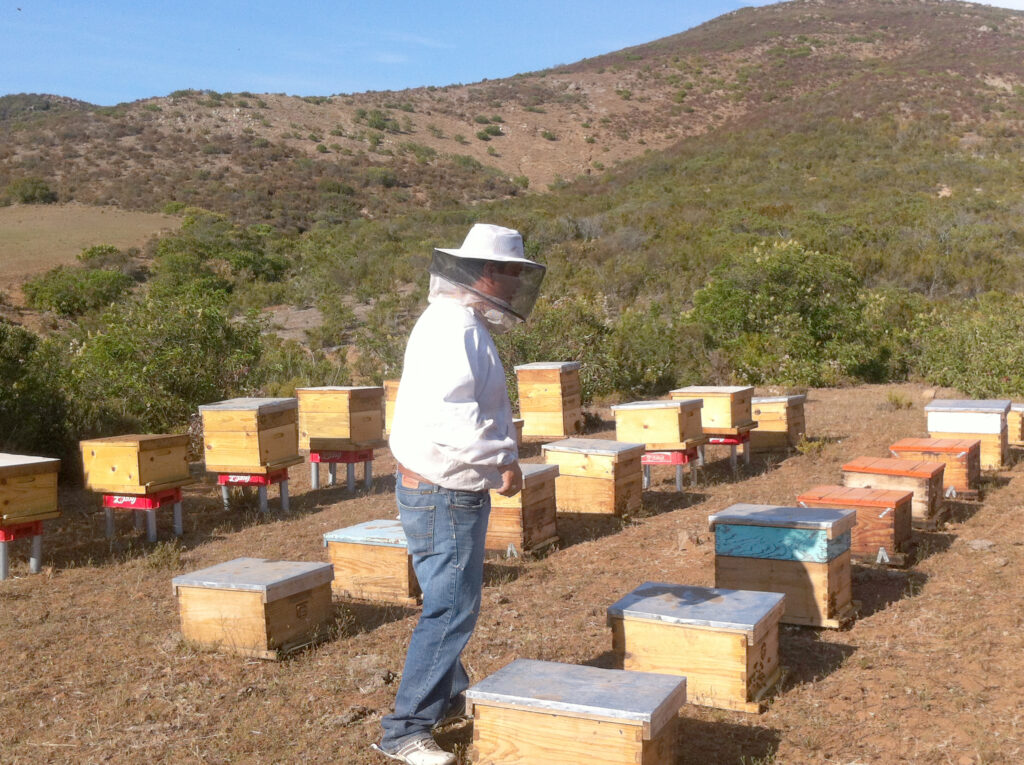It’s spring in Baja California and the bees are loving the wild flowers and are happy in our gardens. We seldom pay attention to them, unless we get buzzed or one swoops in to join us for lunch. Rarely do we consider how important they are to our way of life. They go about their work in honey production, but as they do this they are also a major contributor to our healthy food systems. Without them the planet’s ecosystems would be dramatically altered.
We humans tend to care about things when we understand them. To appreciate bees more, a few fun facts are helpful. Did you know that the reason bees are so noisy is because they beat their wings 11,400 times in one minute! Honey bees love to dance and their moves are the way they communicate. Next time we put honey in our cereal we can thank the whole hive of bees for flying over 55,000 miles to make a 16 ounce jar for us. And to cover that kind of mileage they fly at 20 miles an hour. To keep us all in honey the queen has to lay 2,000 eggs per day.
Science is telling us that there is a noticeable and steady decline in the bee population. Both scientists and beekeepers believe there are a combination of factors which are mostly created by man; the loss of habitat and increased usage of pesticides are but a couple listed. Most recently, there have been studies about the effects of cell phone signals. The question that is being kicked around is that the phone signals whizzing around in space disorientates the flight of bees, causing confusion and low honey production. Research on behalf of the bees is not well funded, but there is enough evidence for the fact that it is harmful to humans. It is one simple step to suggest that the invisible signal disrupts the bees’ sensitivities. One study on humans stated, “EMF disrupts the chemical structures of tissue since a high degree of electromagnetic energy absorption can change the electric current in the body.”
National Library of Medicine reports that the intensity of electromagnetic radiation in human environment is increasing and currently reaches astronomical levels that had never before been experienced on our planet. EMF impacts living organisms by direct tissue penetration. It isn’t a stretch to think the EMF symptoms for human such as disrupted sleep, headache, fatigue, lack of concentration and dizziness could make a hapless little bee fly in circles.

Is there a way to support the health and well being of ourselves and the bees? Some of the current thinking is to “Go Wild” and let your lawn grow without mowing. Bees love flowering weeds and grasses. Let some of the native plants thrive around your home is a good source of necture. Bees need water too; think about creating a bee pond in a shallow pan with pebbles, no need to clean it as bees love dirty water too. Support your local organic farmer. And it should go without saying, stop using toxic sprays. One of the most brilliant new ideas I am hearing is happening right here in Baja California.
Reagan White, a student from Escuela de Comunicación Transcultural in Tijuana, contacted me. The school offers classes meant to look at how to build a business in a foreign country that can help people. He was looking for information for his school project using bees, honey and sustainable living, “We have a business project at our school, where we need to look for business opportunities in Tijuana. My teammates and I are researching bee-keeping for honey production and pollination of farms in Baja.” I suggested several names of people in Ensenada who were well versed in caring for the bee population. Several weeks later Reagan returned to report, “We are through our data-gathering phase of our project and have found the beekeeping community in Baja to be extremely welcoming and kind to us in this school project. We’re currently putting together a PowerPoint presentation for our panel of judges and would like to send that information over to you once it is completed.” I was thrilled with the idea of writing the story.
When the PowerPoint arrived, it was impressive and professionally done. Reagan and the team, Josiah, Elisabeth, Katie, Jacob, and Ruth had laid out clearly where the “gap in the honey market” was to be found. The point was to bring the raw unfiltered honey from the Baja beekeepers and to provide a more affordable and sustainable raw unfiltered honey to the higher purchasing markets of San Diego. In that city there is a high demand for raw unfiltered honey. This then creates jobs, benefits the farmers with higher crop yield due to the natural pollinators like bees with the added benefit that it helps the dwindling bee population. Since beekeeping is already aligned with Mexico’s direction there would be no issues of implementation. This is a win win for people, bees and the planet.
The students developed a three phase marketing plan based on a profit margin that has a “lean start up cost” because it is helpful to the farmers is a possibility of free or low rent. There is naturally lower labor and material cost, and the government has provided beekeeping subsidies. The overall good news about this is there is a “high price point and consistent demand.” Their figures showed that by the fifth year there would be no need for further outside capital, thanks to nature’s amazing bees.
This business model is the wave of the future. It is a must that intelligent ideas include sustainability, health and wellbeing for humanity, the planet, and all its creatures.
With a delightful Mexican play on words, the English word honey is pronounced Hunnie in Spanish. They named the new product, Hey Hunnie!
BeeKeepers in Ensenada
Amado Abejas
52.646-127-7256
Dayan Amanda Moran Lugo
646-151-9110
A Bee Rescue Chat group
Roberto 646-141-6859


1 Comment